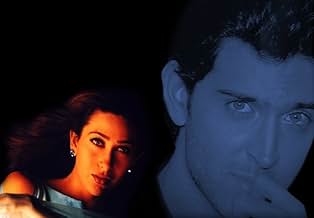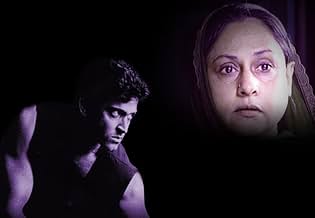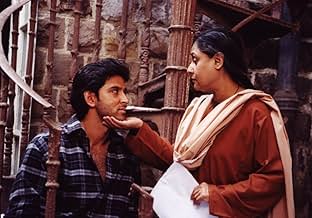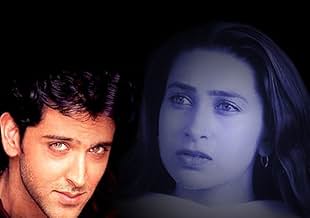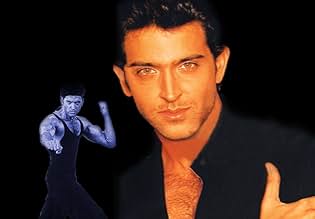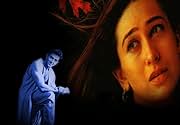NOTE IMDb
6,0/10
4,6 k
MA NOTE
Ajouter une intrigue dans votre langueIn 1993 Fiza's brother Aman disappears during the riots in Mumbai. In 1999 Fiza is tired of waiting and goes looking for him.In 1993 Fiza's brother Aman disappears during the riots in Mumbai. In 1999 Fiza is tired of waiting and goes looking for him.In 1993 Fiza's brother Aman disappears during the riots in Mumbai. In 1999 Fiza is tired of waiting and goes looking for him.
- Réalisation
- Scénario
- Casting principal
- Récompenses
- 12 victoires et 25 nominations au total
Shabana Raza
- Shenaz
- (as Neha)
Johny Lever
- Laughing Club Comic
- (as Jhonny Lever)
Shivaji Satam
- Mr. Sawant
- (as Shivaaji Satam)
Manoj Bajpayee
- Murad Khan (Guest Appearance)
- (as Manoj Bajpai)
Avis à la une
10vlulla
Fiza is definitely one of the better movies churned out by Bollywood in recent times. It carries a message that every religion is good but it is the politicians who are using religion as a weapon and destroying innocent families for ulterior motives. It deals with the problems being faced in India currently which have been repeatedly erupting and causing a huge dent in the economy. Since the past 50 years, every time India has got back on its feet a new politician created calamity has dragged it back down preventing it from being a power to reckon with and doing away with national problems like poverty and illiteracy which prevents people from leading a normal existence. And every time the roots of these calamities can be traced to religion. Everything is not fair in the name of religion. The film has good music and both Karisma & Hrithik have rendered superb award winning performances. Some people may feel that Hrithik's character is not very strong but looking at it from a perspective of what he is subjected to and circumstances which he cannot control make him the person portrayed in the movie. The silent scene of him in the train says it all.
Hrithik Roshan's second and film critic Khalid Mohamed's first movie is an art house film with commercial interludes, obviously deemed necessary for box office performance and integrated with various degrees of success. The film suffers and profits at the same time from the 6 song/dance numbers and one prayer. While the prayer is wonderful and convincingly marries the plot with musical and visual elements, providing an esthetic and also emotional highlight of the film, the dance number by Sushmita Sen and the disco number by Karishma Kapoor, although solid and attractive per se, look forced in the context and have little connection to the film's central themes. The Karishma-Bikram song could be easily edited out at no loss. This is less the case with the Hrithik-Neha sequence which looks and sounds great and adds some desperately needed happiness to an otherwise rather sad sequence of events. And of course it's the only time Hrithik dances. Cutting this one would probably have caused riots in cinemas. The funeral piece is also well integrated and is not an artistic liability. Finally the martial training montage is as commercial and obvious as it gets, exploiting Hrithik Roshan's 'Rambo' aspect at its fullest. Technically well done and a blessing for the box office, no doubt, but artistically a capitulation. A very guilty pleasure indeed. The reason "Fiza" is nonetheless a quite impressive debut film is due to the three leads, two seasoned performers and a newcomer, but all three giving wonderful performances, and an uncompromising look at a subject that is controversial but anything but irrelevant, the Mumbai riots of the early 90s, the ethnic and religious hatred behind it and the unscrupulous forces causing and exploiting it to further their dubious causes. Watch the movie for its cast. This is clearly Karishma Kapoor's best performance so far and likely to fetch awards. As Fiza she shows great strength, resolution and the courage to lay bare emotional depths unseen from her so far. Jaya Bachchan as the mother is solid and turns in a fine performance. Hrithik Roshan, finally, puts to rest all worries that he might be a one film wonder and no real talent. His performance is simply amazing considering this is only his second film. There is hardly one wrong note to be found. His acting comes very naturally, his facial expressions speak volumes. His riot scenes have to be seen to be believed. His screen presence is impressive. He's probably the most charismatic new actor working in films these days, and I'm not talking about India alone. His performance would be very good for an old professional. For a newcomer it's incredible. His future in India and abroad looks extremely bright if that's a standard he can uphold and probably even improve upon. This is an actor to watch very closely in the future. International superstar material.
Some of the poignant scenes and music in the movie are etched in my mind. The jarring note of the funeral and the subtlety of Karisma kapoor's acting. Being the grand daughter of the greatest Indian Film Maker-Raj Kapoor, she has certainly inhertited the genes. Now the much ballyhood actor of recent times- Hrithik Roshan, This guy is so chisseled and handsome that he almost looks like a funny looking kid. Can he act? yes,sometimes; but it is almost painful to watch him. With a V-shaped body, a biceps as big as the state of Montana,and a good disposition towards the opposite sex he will make a good Indian Bond, if only some producer could catch on to this. The problem with the so called "stars" of the 80' generation is that they count on the looks so much they forget they are actors first. If you watched the Movie Monsoon Wedding there is this charecter "P.k. Dubey" done by an actor called Vijay Raaz,who no one in right mind accuse him of being handsome,but he churned a great performance and he repeated the feat in some small roles in"Road" and "Shakti".Frankly I rather watch him or Morgan Freeman in Shanshank Redemtion. The looks draw the audience initially but to sustain thereon you need a talent like Anil Kapoor or Amitab Bachchan. Sorry Kiddo you are not going to cut it. I loved the music including the prayer song, the duet, and the very aesthetic and sexy number by Sushmita Sen so much so she made it to the cover of a Hollywood Film Magazine. Some of the best "Bollywood" dances in the recent years were in "Om Jai Jagdish" and "Humraaz". Suffice to say that I have seen the above movies just for the Song and dance numbers and if done well they could be highly entertaining.
First time director Khalid Mohammed, who is a respected film critic, dons on a new cap and displays to Indian cinema what can be achieved visually in a film, and how a plot can take its audience to high expectations. This newly developed plot, with characteristics and representations that is very much three dimensional and anti-stereotype, commends the director for his skills as a film-maker.
Its very rare to find an woman, displayed on the moving canvas, as independent, strong and intelligent. Films like Mother India (1965), Bandit Queen (1996), Roja (1993), Hazzar Churasi Ki Maa (1998) and The Terrorist (1998/1999) are examples and the movie Fiza (2000) joins such list. Here the main character called Fiza, played wonderfully by Karishma Kapoor, is seen as such. Fiza is a woman presented in a material world that profits from politics and religion, a male dominated environment. Fiza, which means seasons, goes out in a dangerous world to find her brother, who is in contrast to Fiza as we soon learn.
Amman, played convincingly by the talented Hrithik Roshan, is seen as rather weak willed, easy to command over and psychologically unbalanced while finding his own identity. Even though he is built as a strong man through his physicality, his inner strength is weak and Fiza knows this. This forms part of the reason for his search when she leans that he is has associated with a terrorist group and the justification for this is rather strong. It also shows that man is not as perfect as they think to be and really brings out a new representation of them in this Indian film.
The characteristic of the mother, played by the wonderful theatrical actor Jaya Bachchan, is also similar to Fiza which has been fully developed making audiences emotionally bonded with her. This is due to her growing up in the times of post independence when women were considered to be below the male species in India. Living throughout two generations she carries both ideologies of the past and present seen through her own eyes. While respecting her religion very thoroughly, she is seen to be very close to her children and loves them dearly. This adds another reason why Fiza needs to find her brother, to make sure that her mother remains strong like her and that her believes that her son is still alive is true.
Yet when she sees the real colors of her son, she is dismayed and admits defeat. Sadly she commits suicide as a result. Many audience found this to be rather 'Indian cinema'. Yet to me it makes sense why the director took this path. She is a product of the past, and of faith. When she realizes that her faith of bringing Amman had failed in her eyes, she cannot face herself and as a result dies. If Fiza had a son, like Amman and the same circumstances happened in the future then Fiza would be able to cope with this as society is much more open then it was when Nishatbi was growing up. Clearly the director has thought-out the characters past, present and future rather wonderfully and intelligent audience who capture this understand engage in the film more deeply then what the film offers us on the surface.
There are moments when the film does play on stereotypes with the ministers, leaders, hit men and media, and this could have been improved upon. Yet these Indian cinema conventions manage to work within this screenplay as it is very brief and never dwelled upon. Other minor disappointments with the movie is the way songs come into the narrative structure making this film seem more apt-able for commercial cinema audiences. Dances, glamor and overly high modern songs seen in this film don't agree with the overall narrative jarring the viewing senses and prolonging time. The song only applicable for the film would be 'Piya Haji Ali', beautifully composed by A.R. Rahman, and the song 'Mere Watan' composed by Ranjit Barot as they help with the film's screenplay.
Now that I have talked about the content of the film lets ponder over the technical values, all of which are breathtaking. Cinematography by Santosh Sivan is excellent throughout capturing the images and light effects with perfection, while art design work is also very realistic and helps with the overall look of the film. Editing is also rather good and manages to blend the scenes rather well never deviating from the core matter, just wish those useless songs were edited out.
The film is an interesting concept from the new director and displays that his future work will be something all audiences will view with high expectations. But the director must move away from the 20 year old conventions we have seen in all of Indian films, in order to achieve something properly intellectual. Still Fiza is a good movie with brilliant characters, acting and technical credits.
Its very rare to find an woman, displayed on the moving canvas, as independent, strong and intelligent. Films like Mother India (1965), Bandit Queen (1996), Roja (1993), Hazzar Churasi Ki Maa (1998) and The Terrorist (1998/1999) are examples and the movie Fiza (2000) joins such list. Here the main character called Fiza, played wonderfully by Karishma Kapoor, is seen as such. Fiza is a woman presented in a material world that profits from politics and religion, a male dominated environment. Fiza, which means seasons, goes out in a dangerous world to find her brother, who is in contrast to Fiza as we soon learn.
Amman, played convincingly by the talented Hrithik Roshan, is seen as rather weak willed, easy to command over and psychologically unbalanced while finding his own identity. Even though he is built as a strong man through his physicality, his inner strength is weak and Fiza knows this. This forms part of the reason for his search when she leans that he is has associated with a terrorist group and the justification for this is rather strong. It also shows that man is not as perfect as they think to be and really brings out a new representation of them in this Indian film.
The characteristic of the mother, played by the wonderful theatrical actor Jaya Bachchan, is also similar to Fiza which has been fully developed making audiences emotionally bonded with her. This is due to her growing up in the times of post independence when women were considered to be below the male species in India. Living throughout two generations she carries both ideologies of the past and present seen through her own eyes. While respecting her religion very thoroughly, she is seen to be very close to her children and loves them dearly. This adds another reason why Fiza needs to find her brother, to make sure that her mother remains strong like her and that her believes that her son is still alive is true.
Yet when she sees the real colors of her son, she is dismayed and admits defeat. Sadly she commits suicide as a result. Many audience found this to be rather 'Indian cinema'. Yet to me it makes sense why the director took this path. She is a product of the past, and of faith. When she realizes that her faith of bringing Amman had failed in her eyes, she cannot face herself and as a result dies. If Fiza had a son, like Amman and the same circumstances happened in the future then Fiza would be able to cope with this as society is much more open then it was when Nishatbi was growing up. Clearly the director has thought-out the characters past, present and future rather wonderfully and intelligent audience who capture this understand engage in the film more deeply then what the film offers us on the surface.
There are moments when the film does play on stereotypes with the ministers, leaders, hit men and media, and this could have been improved upon. Yet these Indian cinema conventions manage to work within this screenplay as it is very brief and never dwelled upon. Other minor disappointments with the movie is the way songs come into the narrative structure making this film seem more apt-able for commercial cinema audiences. Dances, glamor and overly high modern songs seen in this film don't agree with the overall narrative jarring the viewing senses and prolonging time. The song only applicable for the film would be 'Piya Haji Ali', beautifully composed by A.R. Rahman, and the song 'Mere Watan' composed by Ranjit Barot as they help with the film's screenplay.
Now that I have talked about the content of the film lets ponder over the technical values, all of which are breathtaking. Cinematography by Santosh Sivan is excellent throughout capturing the images and light effects with perfection, while art design work is also very realistic and helps with the overall look of the film. Editing is also rather good and manages to blend the scenes rather well never deviating from the core matter, just wish those useless songs were edited out.
The film is an interesting concept from the new director and displays that his future work will be something all audiences will view with high expectations. But the director must move away from the 20 year old conventions we have seen in all of Indian films, in order to achieve something properly intellectual. Still Fiza is a good movie with brilliant characters, acting and technical credits.
Kahalid Mohamed's Fiza is one gem of a movie. This is a realistic portrayal of the consequences of war, violence, hatred, and the dehumanisation of people at times of a war. Families losing people, parents losing sons, sisters losing brothers and so on. This film is about Fiza, a smart, intelligent and strong young Muslim woman who lost her brother Aman seven years ago during the 1993 Mumbai riots. He disappeared and no one knows where he is. Meanwhile, she and her suffering mother live a poor and ordinary lifestyle. Fiza decides to go in search of her brother and is well determined to find him by any means possible. She meets different people on her way and finally meets her brother, just to find out that he is not the simple young man he used to be.
The film is brilliantly narrated, well pictured, and quite authentically portrayed and acted, so I believe most people will find it easy to relate to the story, to the characters and their different tribulations. The dialogues are well-written and they often waver between the realistic and the utterly theatrical, but that is really a nice sort of balance as far as I'm concerned. The people Fiza meets on her way represent the variety of people in our society: the bad, the good, the deceived, the corrupted, the ugly and the generous. The story changes drastically when Aman enters the picture, it becomes lighter and does lend some relief after the more intense first half. But it's just for a little while. The film soon becomes far more dramatic and intense with some shocking twists. Some of the proceedings are heart-breaking and powerful.
Karisma Kapoor delivers one of the finest performances the Hindi screen has seen. What a magnificent performance. She is natural, sincere, beautiful, charismatic, charming, and performs with great nerve, depth and conviction in every frame. She makes the feisty Fiza an unforgettable woman. One particular scene that must be noted is the one in which Fiza breaks down and starts literally mourning post a very tragic incident (see the film to understand). It is an extremely powerful and heart-rending moment of real pain and despair.
Jaya Bachchan, in one of her best performances, is amazingly compelling and moving as the hurt yet vivacious and lively Nishatbi. She displays maternal pain and later helplessness and despair with amazing depth and pathos. Her silence, as one can expect from an actress as skilled as she is, tugs at the heartstrings. Hrithik Roshan is impressively competent. His role is very complex and he plays it with complete dedication even if sometimes something is missing and it feels too starry. It's a very good performance overall, though he obviously does not create the same kind of impact as his female co-stars. Other cast members, including Asha Sachdev, Manoj Bajpai and Neha, support very well. Asha Sachdev in particular stands out in a relatively small role. She provides great comic relief with her natural sense of humour. There is also a funny sequence with Johnny Lever imitating different Indian stars.
The music is fantastic and helps to relieve the otherwise extremely serious proceedings. Sushmita Sen's number "Mehboob Mere" was effective, but the one I liked the most is Karisma's "Aankh Milaoongi" dance number. She danced very well and I found the number quite alluring despite its evident irrelevance within this film. "Aaja Mahiya" and "Tu Fiza Hai" are very melodious and romantic.
Khalid Mohammed, a well-known film critic, must have stored the idea for a real and artistic film for a long time. His attempts to draw balance between the mainstream and the so-called art cinema within this film, are a little weird at times but still, this is a wonderfully made film in all aspects. It is authentic, not one-sided, it conveys emotion, fun, entertainment, tears, pain, without going to any extremes of unnecessary drama. The story is interesting and, combined with the good acting, manages to keep the audience, and I'm speaking for myself, constantly engaged. The cinematography is fantastic, the action is not overdone (okay maybe just sometimes), and the background score is exceptional. The ending is shocking but contributes to the drama. This film is highly recommended for all those who love Bollywood films, or realistic films, or just films that make sense.
The film is brilliantly narrated, well pictured, and quite authentically portrayed and acted, so I believe most people will find it easy to relate to the story, to the characters and their different tribulations. The dialogues are well-written and they often waver between the realistic and the utterly theatrical, but that is really a nice sort of balance as far as I'm concerned. The people Fiza meets on her way represent the variety of people in our society: the bad, the good, the deceived, the corrupted, the ugly and the generous. The story changes drastically when Aman enters the picture, it becomes lighter and does lend some relief after the more intense first half. But it's just for a little while. The film soon becomes far more dramatic and intense with some shocking twists. Some of the proceedings are heart-breaking and powerful.
Karisma Kapoor delivers one of the finest performances the Hindi screen has seen. What a magnificent performance. She is natural, sincere, beautiful, charismatic, charming, and performs with great nerve, depth and conviction in every frame. She makes the feisty Fiza an unforgettable woman. One particular scene that must be noted is the one in which Fiza breaks down and starts literally mourning post a very tragic incident (see the film to understand). It is an extremely powerful and heart-rending moment of real pain and despair.
Jaya Bachchan, in one of her best performances, is amazingly compelling and moving as the hurt yet vivacious and lively Nishatbi. She displays maternal pain and later helplessness and despair with amazing depth and pathos. Her silence, as one can expect from an actress as skilled as she is, tugs at the heartstrings. Hrithik Roshan is impressively competent. His role is very complex and he plays it with complete dedication even if sometimes something is missing and it feels too starry. It's a very good performance overall, though he obviously does not create the same kind of impact as his female co-stars. Other cast members, including Asha Sachdev, Manoj Bajpai and Neha, support very well. Asha Sachdev in particular stands out in a relatively small role. She provides great comic relief with her natural sense of humour. There is also a funny sequence with Johnny Lever imitating different Indian stars.
The music is fantastic and helps to relieve the otherwise extremely serious proceedings. Sushmita Sen's number "Mehboob Mere" was effective, but the one I liked the most is Karisma's "Aankh Milaoongi" dance number. She danced very well and I found the number quite alluring despite its evident irrelevance within this film. "Aaja Mahiya" and "Tu Fiza Hai" are very melodious and romantic.
Khalid Mohammed, a well-known film critic, must have stored the idea for a real and artistic film for a long time. His attempts to draw balance between the mainstream and the so-called art cinema within this film, are a little weird at times but still, this is a wonderfully made film in all aspects. It is authentic, not one-sided, it conveys emotion, fun, entertainment, tears, pain, without going to any extremes of unnecessary drama. The story is interesting and, combined with the good acting, manages to keep the audience, and I'm speaking for myself, constantly engaged. The cinematography is fantastic, the action is not overdone (okay maybe just sometimes), and the background score is exceptional. The ending is shocking but contributes to the drama. This film is highly recommended for all those who love Bollywood films, or realistic films, or just films that make sense.
Le saviez-vous
- AnecdotesThe film was set to be a artistic film. But Khalid Mohammed decided to commercialize the film due to pressure from the distributors. Karishma Kapoor had a dance number added. Johnny Lever park scene was added. More songs were added. Hrithik's role increased including his work out and more songs.
- GaffesThe dead mother shows eye movement in her first shot as a body.
- ConnexionsReferenced in SRF DOK: Bollywood im Alpenrausch (2000)
- Bandes originalesAaja Mahiya
Written by Gulzar (as Sampooran Singh Gulzar)
Composed by Anu Malik
Performed by Udit Narayan and Alka Yagnik
Courtesy of Tips Cassettes & Records Co.
Meilleurs choix
Connectez-vous pour évaluer et suivre la liste de favoris afin de recevoir des recommandations personnalisées
- How long is Fiza?Alimenté par Alexa
Détails
- Date de sortie
- Pays d’origine
- Site officiel
- Langues
- Aussi connu sous le nom de
- В поисках брата
- Lieux de tournage
- Sociétés de production
- Voir plus de crédits d'entreprise sur IMDbPro
Box-office
- Budget
- 1 000 000 $US (estimé)
- Montant brut aux États-Unis et au Canada
- 596 591 $US
- Week-end de sortie aux États-Unis et au Canada
- 374 708 $US
- 10 sept. 2000
- Montant brut mondial
- 596 591 $US
- Durée2 heures 50 minutes
- Couleur
- Mixage
- Rapport de forme
- 2.35 : 1
Contribuer à cette page
Suggérer une modification ou ajouter du contenu manquant





